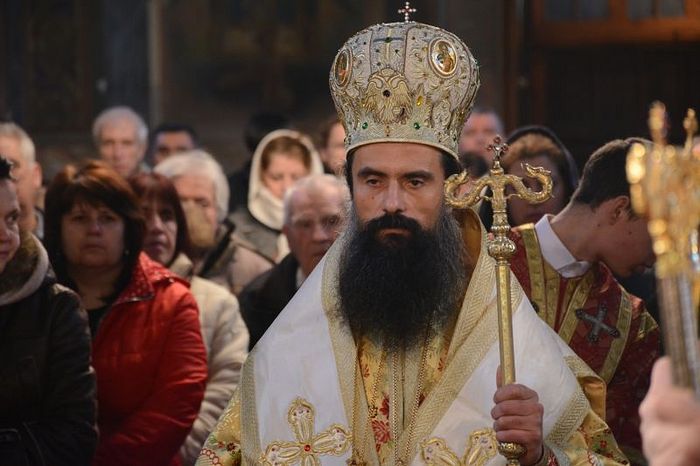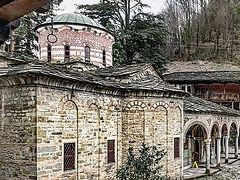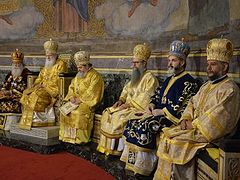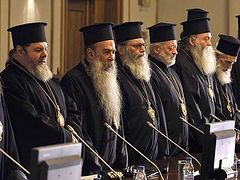“I will answer you in the words of one of the archbishops of the canonical Church, with which he responded to the invitation of Patriarch Bartholomew to attend this assembly: I am firmly convinced and confess that I remain faithful to the One Orthodox Church, and my presence at this council contradicts the first Psalm of David, which reads as follows, “Blessed is the man that hath not walked in the counsel of the ungodly, nor stood in the way of sinners, nor sat in the seat of the pestilent. But his will is rather in the law of the Lord, and in His law will he meditate day and night.” What could be the outcome of a council that is convened in violation of the canonical order and involving persons outside the Church? In my opinion, this Council will not heal the division among the faithful people in Ukraine, but will deepen it. In this whole mournful situation there is a comforting thing – the desire of Orthodox people in this country to preserve the unity of the Holy Orthodox Church, and that this finds a response and support across the entire Orthodox world.”
This is what Metropolitan Daniel of Vidin says in an interview for glasove.com on the occasion of the assembly on December 15 in Ukraine convened by the Patriarch of Constantinople. The date for its conducting was announced by President Petro Poroshenko, who informed that an autocephalous local Orthodox church in Ukraine would be established at the assembly. Poroshenko said the council would approve its statutes and choose a primate to obtain from the Ecumenical Patriarch tomos (testimony) of the autocephaly.
Why is the position of the Holy Synod of the Bulgarian Orthodox Church concerning the schism crisis in Ukraine being protracted?
The Holy Synod is a collective, conciliar body of governing, and decisions are taken by a majority, in accordance with the Statutes of the Bulgarian Orthodox Church. Considering this question, the Holy Synod appointed a commission to examine more thoroughly all documents related to the Church crisis in Ukraine and only then to come up with an opinion. At the discussions during the synodal sessions, there were metropolitans, including myself, who wanted a position to be expressed, but as I already said, the Holy Synod is a collective body. At the same time, everyone bears a personal responsibility for his own voice, both before God and before God’s people. Why do we think we need to express a position? Because the Church is one and conciliar, as we confess in the Symbol of the Faith. In this sense, the dispute in Ukraine is not just a dispute between two local Orthodox churches. It affects the entire Orthodox Church.
What is your personal opinion on this question and why do you think it affects the entire Orthodox Church?
This affects the whole Orthodox Church because inter-Orthodox relations are affected. It violates the millennial Canon Law of the Church, one of the basic principles of which is the principle of the boundaries of Church jurisdiction. These limits are clearly defined and generally recognized. Each autocephalous Church has the right to self-governance within its boundaries and does not have the right to extend their jurisdiction in other local Churches. Here we will list only rule 2 of the Second Ecumenical Council, and rule 8 of the Third Ecumenical Council, which prohibits the individual local Orthodox Churches to extend their jurisdiction beyond the bounds of their area.
In your opinion, has Patriarch Bartholomew crossed the limits of his jurisdiction?
We definitely deem so. Since his Holiness Patriarch Bartholomew has been at the lead of the Constantinople Patriarchy, (i.e. from 1991 until now), he has always acknowledged that the Ukrainian Orthodox Church is under the jurisdiction of the Moscow Patriarchate in an indisputable way, with a number of letters and documents endorsed with his signature. Now he suddenly states that the Kiev Metropolis was never given under the full jurisdiction of the Moscow Patriarchate.
It is pointed out that in the famous document of 1686, by which the Constantinople Church entitles the Moscow Patriarch to ordain the metropolitan of the Kiev Metropolis, there was a requirement that the name of the Patriarch of Constantinople be commemorated. And this also is considered as a sign of recognition of the jurisdiction of the Patriarch of Constantinople over the Kiev Metropolis. It is another question how legitimate these claims are, but they are only declared today – three hundred years after the act in question was issued.
At the same time, the Church rules define periods of limitation for disputes over the right to jurisdiction over certain territories. For example, rule 133 of the Carthaginian Council sets a three-year statute of limitation. If a Bishop believes that another Bishop has entered a part of its territory, he has three years to file a claim. Rule 17 of the Fourth Ecumenical Council and rule 25 of the Fifth-Sixth Ecumenical Council provide a limitation period of 30 years in which disputes over jurisdiction over certain parishes can be settled. And in our case, a few centuries have passed.
In terms of Canon Law, these disputes are inadmissible. Here’s an example: in 1917 The Patriarch of Constantinople, German V, writes the following to the bishop of the Georgian Church after its self-proclamation for autocephalous: “I do not know and cannot know a self-contained Georgian Church, since for more than one hundred years, the Orthodox Georgians have been under the rule of the Russian Church. Your separation and formation of an autocephalous Church is only possible with the consent of your church with the Russian one (…) We cannot interfere in your internal Church matters, but advise you fatherly, to listen to the voice of your pastor, and in this way to bring this issue into the river-bed of the salvific Church canons.”
The claim of the Patriarch of Constantinople that his rights are infringed, (as the Kiev Metropolitan does not commemorate his name during Divine Services), is untenable, but is used as a formal occasion for the document from 1686 to be repealed. But this situation has not been contested for 300 years.
For three centuries the Orthodox people in Ukraine have lived in complete unity and have been an integral part of the Russian Orthodox Church. Since then, Kiev Metropolitans have been members of the Holy Synod of the Russian Church, and have elected, and have had the right to be elected as Patriarchs.
During all these 300 years, the Ukrainian believers have recognized Moscow’s Patriarch as their spiritual primate. Can someone after some 300 years come from outside and say: I am your father? Who’s going to follow him and who’s going to believe him? How can one proclaim himself as the spiritual father of a people, when the people know, remember, and honor the fathers who have begotten and brought them up in the faith? The sacred canons are categorical in this regard.
But for the people outside, it is not clear why Ukraine, after being an independent country, does not have its own independent Church?
Let’s first see what the Orthodox people and their canonical hierarchs in Ukraine say, because that is essential. The hierarchal council, convened by the Ukrainian Orthodox Church in reference to these events on November 13th of this year, in which 83 hierarchs participated, expressed an explicit position against the encroachment of the Constantinople Patriarchy into her canonical boundaries, as it stated that “the Ukrainian Orthodox Church is self-governed, endowed with all the rights of independence and autonomy that are today necessary for the fruitful service of God and of the people of Ukraine.”
The Ukrainian Orthodox Church of the Moscow Patriarchate (UOC-MP) has over 12,000 parishes, which is more than the two schismatic groups, (the Ukrainian Orthodox Church-Kiev Patriarchate (UOC KP) and the so-called Autocephalous Ukrainian Orthodox Church), combined.
Therefore, in his letters to the Bulgarian Patriarch and to the primates of the other local Churches, Metropolitan Onuphry correctly expresses his perplexity as to why no one takes into consideration the appeal of thousands of members of the UOC to Patriarch Bartholomew asking autocephaly for these schismatic groups not to be granted.
Why is the voice of a group of people being taken into consideration selectively before the voice of the canonical Church and its flock? Indeed, all canonized saints of the twentieth century in Ukraine urge their spiritual children to preserve sacred the unity of the Ukrainian Orthodox Church with the Russian one.
Let’s look at another side of the issue. Who are those who insist on autocephaly? The state authorities first of all. As Metropolitan Onuphry rightly notes, the authorities only hear the voices of those groups that burn Churches, profess nationalism, call for hatred, and cry “death to Moscow.” Why are their voices and demands for autocephaly the only ones to be heard?
It is obvious that these same state authorities are preparing to take matters into their own hands. Why is the opinion of the only recognized canonical Ukrainian Orthodox Church not taken into account? What makes the opinion of groups whose leaders have been deprived from their spiritual dignity and excommunicated from the Church more trustworthy?
Could an analogy be made with the schism in the Bulgarian Orthodox Church 20 years ago?
Yes, to a great extent. As the schism in the Bulgarian Orthodox Church was inspired and supported by the state authority, the same is happening in Ukraine. In our country, the schism was overcome, thanks to the Orthodox Council of 1998, convened at the initiative of the BOC in Sofia.
At that time, the Ecumenical Patriarch acted quite differently compared to today. Can we talk about a double standard?
Actually, at the 1998 council, the Ecumenical Patriarch posed the question of the resignation of Patriarch Maxim, but then our predecessors, (hierarchs with spiritual experience and valor), opposed him and said, “We have called you here to heal the schism, not to deepen it.” So the parallel between the schism in our country and the one in Ukraine is completely relevant.
At the moment, the UOC MP is in the same position as the BOC was then. In our country the schismatics also tried to rob the Church’s identity, to despoil shrines, to usurp property of which they were not entitled. And most grievously, destroying their moral appearance, and killing the people’s faith. Because we know how they ended, and what their deeds in the faith were. The same is happening in Ukraine.
In 1992, the former Metropolitan of Kiev, Philaret, was deprived of his dignity for his falling into schism and due to proven moral transgressions in personal aspects, and later excommunicated by the Church. So his removal was laid down legitimately, for good reasons due to a number of canonical violations. And in its decision from October 11th, in complete contradiction with the sacred Canons, the Patriarchate of Constantinople restored that man.
Finally, what should be the position of the BOC in your opinion?
Three metropolitans of the Holy Synod came out with a statement on the situation in Ukraine,in which, proceeding from the experience of the Pan-Orthodox council from 1998, which overcame the schism in our country, we proposed in this case to proceed in the same way and for the matter to be offered for a Pan-Orthodox discussion.
For a Pan-Orthodox council to be convened?
This can happen in different ways. First, resuming the dialogue between the Patriarchate of Constantinople and the Russian Orthodox Church, in view of the ROC’s decision to end Eucharistic communion with the Patriarchate of Constantinople. The resumption of dialogue between the two churches, with the participation of representatives of the rest of the local churches, is a way the wound in Ukraine can be healed. In the end, any decision concerning the Local Orthodox Churches cannot be accepted and permanent without their consent and support.
A “unification council”, convened by the Patriarch of Constantinople will be held on December 15th in Kiev. What do you think will be the result of it?
I will answer you in the words of one of the archbishops of the canonical Church, with which he responded to the invitation of Patriarch Bartholomew to attend this assembly: “I am firmly convinced and confess that I remain faithful to the One Orthodox Church, and my presence at this council contradicts the first Psalm of David, which reads as follows, “Blessed is the man that hath not walked in the counsel of the ungodly, nor stood in the way of sinners, nor sat in the seat of the pestilent. But his will is rather in the law of the Lord, and in His law will he meditate day and night.”
What could be the outcome of a council that is convened in violation of the canonical order and involving persons outside the Church? In my opinion, this Council will not heal the division among the faithful people in Ukraine, but will deepen it. In this whole mournful situation there is a comforting thing – the desire of Orthodox people in this country to preserve the unity of the Holy Orthodox Church, and that this finds a response and support across the entire Orthodox world.”
Is there a political pressure on the Synod of BOC to tilt the scales for one or another solution – from the Russian or American side? Or, from the side of the Ecumenical Patriarchate, which expresses certain interests?
I can categorically say that during the discussions in the Holy Synod, the Metropolitans express their own views. So the debates and decisions are made on the basis of the conceptions and conscience of each of the hierarchs.
This is not a direct answer. Is there any political pressure, in your opinion? From the Russian side or from the Americans (through the Bulgarian government), which is in fact the instigator of the actions of the Ecumenical Patriarch?
I can only testify for myself. I can categorically state that nobody has put any pressure on me. In view of the progress of the situation, at this time, it is necessary for all Orthodox Christians to increase our prayers for the preservation of the unity of the Holy Orthodox Church in Ukraine, and in the whole world.
Interviewer: Yavor Dachkov
Translation from Orthodox England





